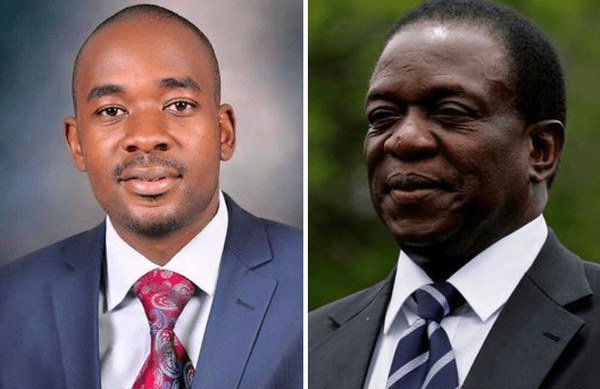By Veritas
In the early hours of the morning on 3rd August, the chairperson of the Zimbabwe Electoral Commission [ZEC] declared Mr Mnangagwa to have been duly elected as President of Zimbabwe. The MDC Alliance has said the result will be challenged in court.
This Election Watch outlines the time limits for bringing a challenge, the form the challenge might take and what remedies could be granted if it succeeds.
Time Limits for Challenge
According to section 93 of the Constitution, “any aggrieved candidate” may challenge the election of a President by bringing a petition or application to the Constitutional Court within seven days after the declaration of the results of the election. So Mr Chamisa and any other aggrieved candidates have until close of business on Friday 10th August to lodge their petitions or applications.
Note that under section 93 of the Constitution:
· only an unsuccessful candidate can bring a challenge.
· only the Constitutional Court can hear a challenge to a presidential election. The Electoral Court cannot do so.
Under rule 23 of the Constitutional Court Rules [SI 62/2016] the challenge must be served on the respondent [i.e. President Mnangagwa] within seven days after the declaration of the election result. So the time-limit for lodging the challenge and serving it on the respondent are the same in this case, Friday 10th August.
The respondent then has three days to file his notice of opposition with the Registrar and to serve it on the applicant. If he doesn’t he will be barred from taking any further part in the proceedings.
The applicant then has another three days to file an answering affidavit, if he wishes to do so, and file his heads of argument.
How Quickly must the Constitutional Court Hand Down its Decision?
After a challenge has been lodged and served, the Constitutional Court has just 14 days to hear and decide it [section 93(3) of the Constitution]. Its decision is final.
Constitutional Court’s Powers on Challenge
The Constitutional Court’s decision on a presidential election challenge can take any of the following forms [section 93(4) of the Constitution]:
· it can declare a winner, which means it can confirm ZEC’s declaration or declare another candidate the winner
· it can invalidate the election, in which case a fresh election must be held within 60 days – note this probably means a new election rather than a run-off, or
· it can make any other order it considers just and appropriate. This is very broad, and could cover:
o ordering a run-off election, if the court finds that none of the candidates in fact gained 50 per cent or more of the votes
o ordering a recount of the votes, if the applicant has asked for this.
Note: It is too late for the MDC to ask ZEC directly for a recount – this would have had to be done within 48 hours of the results being declared.
o making an order of costs
Note: security for the respondent’s costs in an amount of at least $500 must be provided by the applicant within seven days of lodging his petition [section 168(3) of the Act, as read with section 28 of the Electoral Regulations, 2005].
Election Act Provisos
Although the court’s powers seem very wide, the Electoral Act puts several hurdles in the way of an applicant who asks the court to exercise them:
· The court will not set aside an election on the ground of mistake or non-compliance with the Act unless the court considers the election was not conducted in accordance with the principles laid down in the Act and the mistake or non-compliance affected the result of the election [section 177 of the Act]. This will be not easy for any challenger to establish. For example, the MDC Alliance may be able to show that ZEC did not conduct the election as transparently as it should have done, and may be able to prove further that ZANU-PF misused State property for electoral purposes, dragooned schoolchildren into attending rallies and suborned traditional leaders; but it would then have to prove that all these irregularities actually affected the result.
· And on the question of transparency, the Electoral Act itself is not clear about the grounds on which a presidential election can be successfully challenged. For example, section 155 of the Act states that an election is void if electoral malpractices were committed with the knowledge, consent or approval of the winning candidate or his or her agents – but the section may not apply to presidential elections.
Overriding Constitutional Provisions
The Constitution obliges the State – which includes the Executive, the Legislature and the Judiciary – to take all appropriate measures to ensure that effect is given to the principles of the electoral system set out in section 157(1) of the Constitution. Those principles include that elections must be peaceful, free and fair, and free from violence and other electoral malpractices. The Constitution takes precedence over any Act. Section 3 of the Electoral Act reiterates that elections are subject to the Constitution and section 3 (a) says “the authority to govern derives from the will of the people demonstrated through elections conducted efficiently, freely, fairly, transparently and properly”. The Constitutional Court will have to read section 177 of the Electoral Act in the light of the principles laid down in the Constitution. Hence if the Court finds that there were egregious and blatant departures from constitutional principles then it will have to set aside the election whether or not the departures can be shown to have affected the result.
When will a President-elect be Sworn in?
If an electoral challenge is lodged:
If a petition or application challenging the validity of the presidential election is lodged, the President-elect’s swearing-in takes place forty-eight hours after the Constitutional Court has announced its decision on the challenge.
If no electoral challenge is lodged:
Under section 94 of the Constitution a President-elect must take the oath of office on the ninth day after he or she was declared elected. This means that the President-elect will take the oath of office as President on Sunday 12th August.






